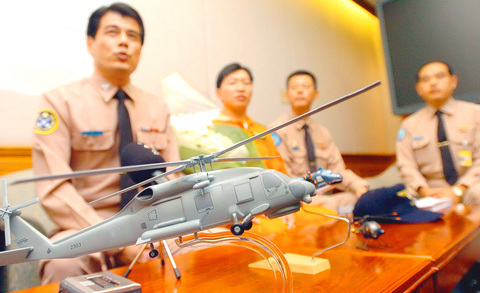A navy pilot yesterday said that the navy's anti-submarine capability is low, and that it needs advanced aircraft to be able to complete its mission.
"The navy's current force of 26 S2T aircrafts is too old to detect China's advanced vessels and submarines," said S2T pilot Hsu Koei-jui (
The legislators called the press conference to urge the public to support purchase of 12 P-3C maritime patrol aircraft from the US -- one of three big-ticket items in a purchase that has been blocked for months by the pan-blue controlled legislature.

PHOTO: WANG YI-SUNG, TAIPEI TIMES
Hsu said that of the navy's 26 S2Ts, only 16 of the 40-year-old aircraft are usable. He said the average S2T mission lasts three hours. The aircraft has no air conditioning, no Global Positioning System (GPS) and few computer systems, and pilots have to operate the aircraft manually -- all of which makes for a high-pressure ride for pilots. Hsu said most S2T pilots consider the aircraft dangerous to fly.
A real admiral from the navy's air command, Ma Jien-chung (
Ma said that only sustained patrols using advanced maritime patrol aircraft such as the P-3C can detect China's submarines when they are underwater. Ma said the navy has calculated that if it procures US P-3Cs, those aircraft could used for more than 20 years.
Ma added the navy mainly patrols waters northeast, southeast and east of Taiwan, and that 12 P-3Cs are enough to protect the nation's waters.
Tang said that the navy's anti-submarine force -- which includes 26 S2Ts, eight 500MD helicopters and 18 S-70C helicopters -- is insufficient.
He said that the air force procured 32 used S2Ts in 1976, and that six of those aircraft crashed before it transferred the force to the navy in 1999. Tang said that the eight 500MD helicopters have been in service for more than 25 years, and that the age of such aircraft has resulted in accidents.
One 500MD helicopter crashed in Kaohsiung in January and a S70-C helicopter crashed into the sea last week, killing one officer. Two crew members are missing and presumed dead.
Tang said those accidents had devastated the families of pilots and crew members, and that the public should support purchases of newer aircraft to help raise the safety, Tang said, appealing for passage of the bill to purchase 12 P-3Cs.

US President Donald Trump said "it’s up to" Chinese President Xi Jinping (習近平) what China does on Taiwan, but that he would be "very unhappy" with a change in the "status quo," the New York Times said in an interview published yesterday. Xi "considers it to be a part of China, and that’s up to him what he’s going to be doing," Trump told the newspaper on Wednesday. "But I’ve expressed to him that I would be very unhappy if he did that, and I don’t think he’ll do that," he added. "I hope he doesn’t do that." Trump made the comments in

Tourism in Kenting fell to a historic low for the second consecutive year last year, impacting hotels and other local businesses that rely on a steady stream of domestic tourists, the latest data showed. A total of 2.139 million tourists visited Kenting last year, down slightly from 2.14 million in 2024, the data showed. The number of tourists who visited the national park on the Hengchun Peninsula peaked in 2015 at 8.37 million people. That number has been below 2.2 million for two years, although there was a spike in October last year due to multiple long weekends. The occupancy rate for hotels

A cold surge advisory was today issued for 18 cities and counties across Taiwan, with temperatures of below 10°C forecast during the day and into tonight, the Central Weather Administration (CWA) said. New Taipei City, Taipei, Taoyuan and Hsinchu, Miaoli and Yilan counties are expected to experience sustained temperatures of 10°C or lower, the CWA said. Temperatures are likely to temporarily drop below 10°C in most other areas, except Taitung, Pingtung, Penghu and Lienchiang (Matsu) counties, CWA data showed. The cold weather is being caused by a strong continental cold air mass, combined with radiative cooling, a process in which heat escapes from

Snow this morning fell on Alishan for the first time in seven years, as a strong continental cold air mass sent temperatures plunging across Taiwan, the Central Weather Administration (CWA) said. The Alishan weather station, located at an elevation of about 2,200m in central Taiwan, recorded snowfall from 8:55am to 9:15am, when the temperature dropped to about 1°C, the CWA said. With increased moisture and low temperatures in the high-altitude Alishan area, the conditions were favorable for snow, CWA forecaster Tsai Yi-chi (蔡伊其) said. The last time snow fell at the Alishan weather station was on Jan. 10, 2018, while graupel fell there